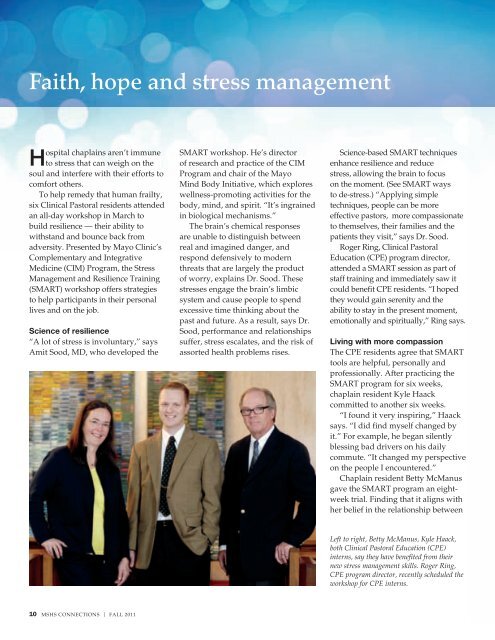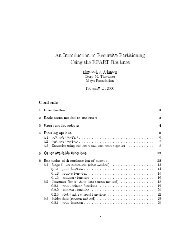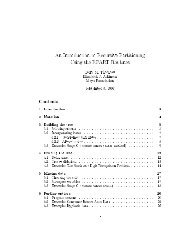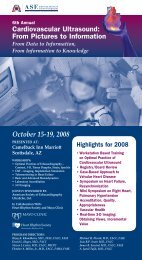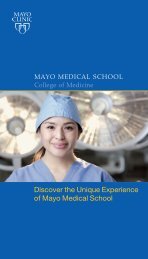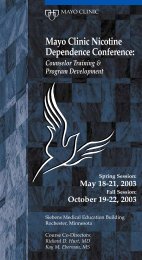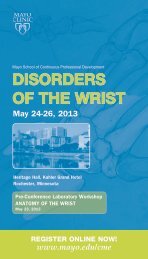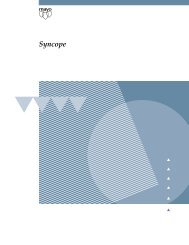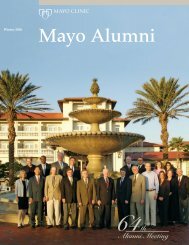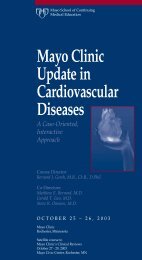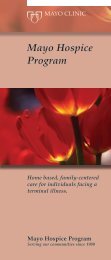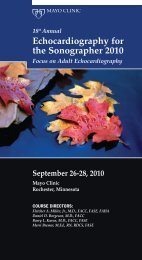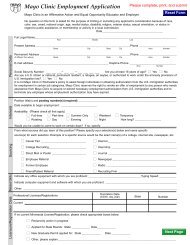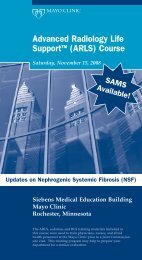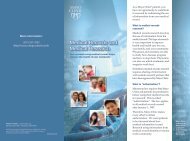MSHS Alumni Connections Mag Fall 2011 - MC4192 ... - Mayo Clinic
MSHS Alumni Connections Mag Fall 2011 - MC4192 ... - Mayo Clinic
MSHS Alumni Connections Mag Fall 2011 - MC4192 ... - Mayo Clinic
You also want an ePaper? Increase the reach of your titles
YUMPU automatically turns print PDFs into web optimized ePapers that Google loves.
Faith, hope and stress management<br />
Hospital chaplains aren’t immune<br />
to stress that can weigh on the<br />
soul and interfere with their efforts to<br />
comfort others.<br />
To help remedy that human frailty,<br />
six <strong>Clinic</strong>al Pastoral residents attended<br />
an all-day workshop in March to<br />
build resilience — their ability to<br />
withstand and bounce back from<br />
adversity. Presented by <strong>Mayo</strong> <strong>Clinic</strong>’s<br />
Complementary and Integrative<br />
Medicine (CIM) Program, the Stress<br />
Management and Resilience Training<br />
(SMART) workshop offers strategies<br />
to help participants in their personal<br />
lives and on the job.<br />
Science of resilience<br />
“A lot of stress is involuntary,” says<br />
Amit Sood, MD, who developed the<br />
SMART workshop. He’s director<br />
of research and practice of the CIM<br />
Program and chair of the <strong>Mayo</strong><br />
Mind Body Initiative, which explores<br />
wellness-promoting activities for the<br />
body, mind, and spirit. “It’s ingrained<br />
in biological mechanisms.”<br />
The brain’s chemical responses<br />
are unable to distinguish between<br />
real and imagined danger, and<br />
respond defensively to modern<br />
threats that are largely the product<br />
of worry, explains Dr. Sood. These<br />
stresses engage the brain’s limbic<br />
system and cause people to spend<br />
excessive time thinking about the<br />
past and future. As a result, says Dr.<br />
Sood, performance and relationships<br />
suffer, stress escalates, and the risk of<br />
assorted health problems rises.<br />
Science-based SMART techniques<br />
enhance resilience and reduce<br />
stress, allowing the brain to focus<br />
on the moment. (See SMART ways<br />
to de-stress.) “Applying simple<br />
techniques, people can be more<br />
effective pastors, more compassionate<br />
to themselves, their families and the<br />
patients they visit,” says Dr. Sood.<br />
Roger Ring, <strong>Clinic</strong>al Pastoral<br />
Education (CPE) program director,<br />
attended a SMART session as part of<br />
staff training and immediately saw it<br />
could benefit CPE residents. “I hoped<br />
they would gain serenity and the<br />
ability to stay in the present moment,<br />
emotionally and spiritually,” Ring says.<br />
Living with more compassion<br />
The CPE residents agree that SMART<br />
tools are helpful, personally and<br />
professionally. After practicing the<br />
SMART program for six weeks,<br />
chaplain resident Kyle Haack<br />
committed to another six weeks.<br />
“I found it very inspiring,” Haack<br />
says. “I did find myself changed by<br />
it.” For example, he began silently<br />
blessing bad drivers on his daily<br />
commute. “It changed my perspective<br />
on the people I encountered.”<br />
Chaplain resident Betty McManus<br />
gave the SMART program an eightweek<br />
trial. Finding that it aligns with<br />
her belief in the relationship between<br />
Left to right, Betty McManus, Kyle Haack,<br />
both <strong>Clinic</strong>al Pastoral Education (CPE)<br />
interns, say they have benefited from their<br />
new stress management skills. Roger Ring,<br />
CPE program director, recently scheduled the<br />
workshop for CPE interns.<br />
10 <strong>MSHS</strong> CONNECTIONS | FAll <strong>2011</strong>


